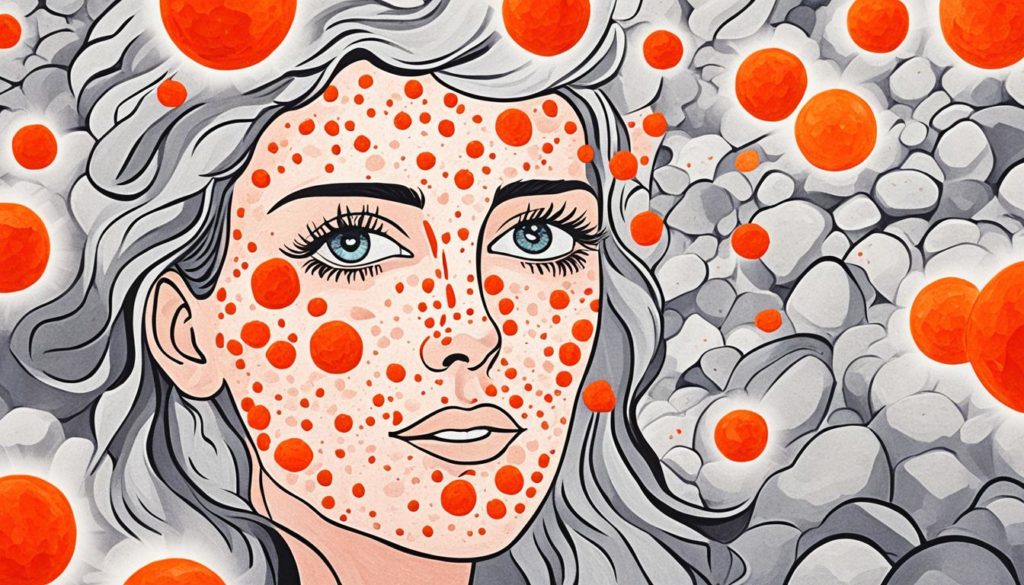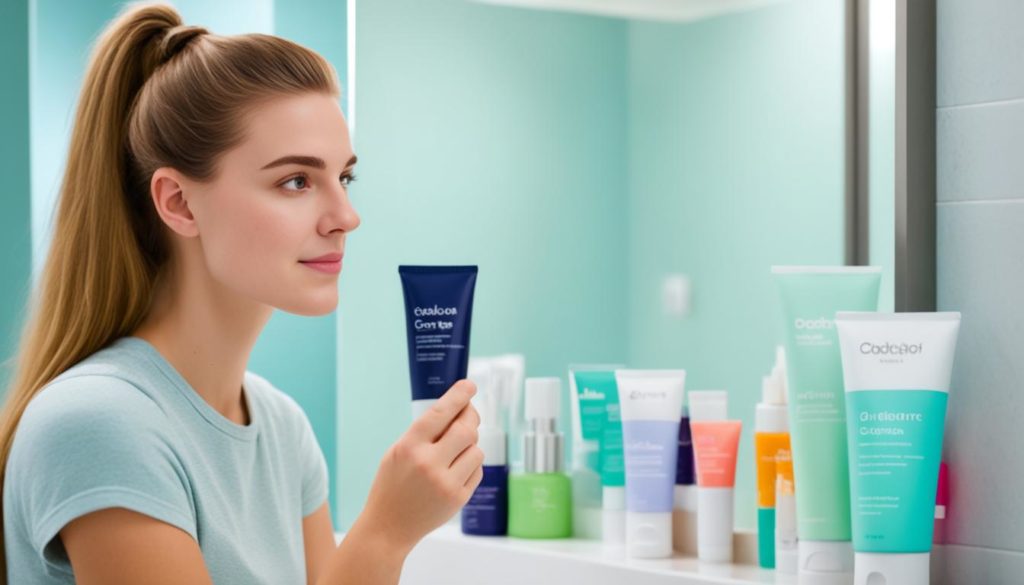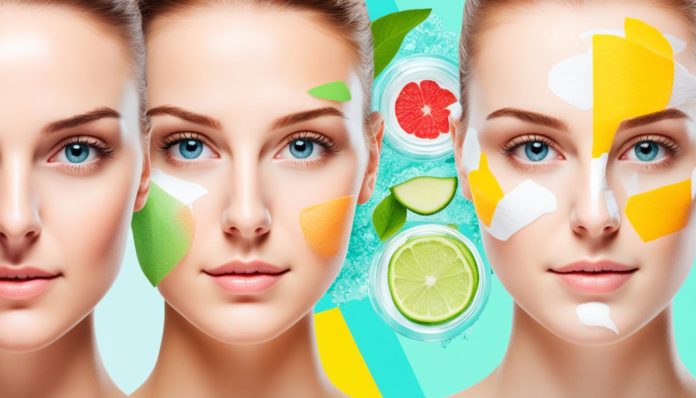Did you know almost 85% of teenagers deal with acne? It’s a top skin issue for young people, greatly impacting their confidence and social life. Knowing how to care for teenage skin is key to beating acne.
Teen acne happens for many reasons, like hormones and genetics. This guide gives the best advice and skincare tips for teens. It’s all about helping them find clear skin and feel more confident as they grow.
Key Takeaways
- Understand the primary causes of teen acne.
- Learn how to select the right skincare products for teens.
- Discover an optimal daily skincare routine.
- Explore over-the-counter and prescribed acne treatments.
- Implement home remedies and lifestyle changes to combat acne.
- Prevent and treat acne scarring effectively.
- Address the mental health impacts of teen acne.
Understanding the Causes of Teen Acne
Acne is a common problem for teenagers. It can happen for many reasons. Understanding these causes is key to finding solutions and stopping more breakouts. Let’s look at the main reasons why teens get acne:
Hormonal Changes
Hormones play a big role in teen acne. During puberty, hormone levels change. This leads to more oil on the skin. When oil mixes with dead skin, it can block pores and cause acne.
Genetic Factors
Genetics also affect teen acne. If your parents had acne as teens, you might too. This is because family genes affect your skin’s oiliness and pore size. This makes some teens more likely to get acne.

Diet and Lifestyle
What you eat and how you live affects acne too. Eating lots of sugars and refined carbs can make acne worse. Stress and not sleeping enough can also lead to breakouts. A healthier diet and lifestyle can help control acne.
| Cause | Impact on Acne |
|---|---|
| Hormonal Changes | Increased oil production leading to clogged pores and breakouts. |
| Genetic Factors | Inherited traits such as pore size and skin type heighten acne risks. |
| Diet and Lifestyle | Poor diet and stress levels can aggravate acne. |
Choosing the Right Skincare Products for Teens
Finding the right skincare products is key for teens. Their skin needs special care, including items that don’t clog pores, gentle cleaners, and moisturizers with SPF protection.

Non-Comedogenic Products
Non-comedogenic products are a must for teens. They prevent clogged pores which can cause acne. Look for brands like Neutrogena and Cetaphil. They offer options that keep skin clear and healthy.
Gentle Cleansers
Gentle cleansers are important for a teen’s skin. They remove dirt without taking away needed oils. Choose products with mild ingredients. Options include Cetaphil Gentle Skin Cleanser or La Roche-Posay Toleriane Hydrating Gentle Cleanser.
Moisturizers and Sun Protection
Keeping skin hydrated and protected from the sun is vital. Pick moisturizers with SPF to block sun damage. A good choice is CeraVe AM Facial Moisturizing Lotion with SPF 30. It’s great for sensitive teen skin.
| Brand | Non-Comedogenic | Gentle Cleanser | Moisturizer with SPF |
|---|---|---|---|
| Neutrogena | Yes | – | – |
| Cetaphil | Yes | Gentle Skin Cleanser | – |
| La Roche-Posay | – | Toleriane Hydrating Gentle Cleanser | – |
| CeraVe | – | – | AM Facial Moisturizing Lotion with SPF 30 |
Daily Skincare Routine for Teenagers
Starting a daily skincare routine early on is key for healthy skin. This routine can fight acne effectively. A regimen with steps for morning, evening, and weekly care will make your skin look and feel better.
Morning Routine
Kicking off your day with a clean face sets the tone. Teens should follow these morning steps:
- Gentle Cleanser: Use a foam or gel to clean without drying your skin.
- Toner: Helps balance your skin’s pH and gets it ready for moisturizer.
- Moisturizer: Pick an oil-free product to keep your skin hydrated.
- Sunscreen: Protects against UV rays and helps prevent acne scars.
Evening Routine
Cleansing your skin at night removes pollutants and fights acne. The evening steps include:
- Makeup Remover: Gently removes makeup.
- Cleanser: A thorough cleanser gets rid of the day’s dirt.
- Treatment Product: Use serums with benzoyl peroxide or salicylic acid for breakouts.
- Moisturizer: A night cream helps skin repair while you sleep.
Weekly Treatments
Adding weekly skincare treatments boosts your daily skincare routine. These treatments help a lot:
| Treatment | Benefits | Frequency |
|---|---|---|
| Exfoliation | Removes dead skin cells, promotes cell turnover, and prevents clogged pores. | 1-2 times/week |
| Face Mask | Targets issues like oiliness or dryness. | 1-2 times/week |
| Spot Treatment | Directly treats blemishes and speeds healing. | As needed |
Over-the-Counter Acne Treatments
There are many easy-to-find acne treatments for teens who need clear skin. These options include key ingredients that fight acne well.
Benzoyl Peroxide
Benzoyl Peroxide is a top choice for teen acne. It kills acne-causing bacteria and helps remove oil and dead skin. You can find it in many products like washes, gels, and creams. It may dry out skin, so start with a small amount and use more as needed.
Salicylic Acid
Salicylic Acid is another great acne remedy for teens. It clears out pores and lowers swelling, great for removing blackheads and whiteheads. Using it regularly keeps pores clear and skin smooth.
Retinoids
Retinoids are another strong choice, though not as common. They speed up skin renewal and stop pores from getting clogged. They can cause redness and peeling at first, so it’s good to slowly add them to your skin care.
| Ingredient | Benefits | Possible Side Effects |
|---|---|---|
| Benzoyl Peroxide | Kills acne-causing bacteria, reduces oil production | Dryness, irritation |
| Salicylic Acid | Unclogs pores, exfoliates skin | Mild stinging, dryness |
| Retinoids | Increases cell turnover, prevents clogs | Redness, peeling |
Choosing these acne treatments means teens should follow the directions and watch how their skin reacts. This helps lessen side effects and gets the best results for a clear face.
Prescribed Medications for Severe Teen Acne
Managing severe teen acne is tough. It often needs prescribed acne medication for good results. Knowing what options are out there and their effects is key for teens and their families.
Getting advice from a dermatologist can offer tailored acne solutions for teens. Dermatologists look at things like acne type and how bad it is. Then, they suggest a prescription. Some commonly prescribed acne meds are:
| Medication Type | Examples | Common Effects |
|---|---|---|
| Topical Antibiotics | Clindamycin, Erythromycin | Reduces bacteria and inflammation |
| Oral Antibiotics | Tetracycline, Doxycycline | Decreases bacterial growth and inflammation |
| Hormonal Treatment | Birth control pills, Spironolactone | Regulates hormone levels |
| Retinoids | Isotretinoin | Reduces oil production and unclogs pores |
Each acne medicine has its own directions and possible side effects. It’s vital to follow the dermatologist’s advice closely. This helps to get the best outcome and lower risks. Being consistent and patient is important. These medications often take weeks before you see changes.
It’s crucial for teens and their guardians to talk openly with their healthcare provider. Discuss any worries and expectations. Proper use and careful monitoring can really help improve severe acne in teens. It also boosts their confidence.
Always see a certified dermatologist to get the right treatment plan for you. They tailor it to your skin’s unique needs.
Home Remedies to Combat Teen Acne
Many teens look for natural ways to fight acne. This part talks about home remedies that can help. These include using natural ingredients, making your own face masks, and changing your lifestyle.
Natural Ingredients
Some of the best natural acne remedies are found in your kitchen. Things like honey, tea tree oil, and aloe vera are great. They have anti-inflammatory and antibacterial benefits.
- Honey: Its natural antiseptic properties help soothe and heal acne-prone skin.
- Tea Tree Oil: Known for its antibacterial effects, it can reduce inflammation.
- Aloe Vera: Offers soothing and moisturizing benefits while reducing redness.
DIY Face Masks
DIY acne solutions are easy to make and useful. You can create these masks with ingredients you already have. Below are some recommended recipes:
- Honey and Cinnamon Mask: Mix 2 tablespoons of honey with 1 teaspoon of cinnamon. Apply to the face for 10-15 minutes and rinse off.
- Aloe Vera and Turmeric Mask: Combine 1 tablespoon of aloe vera gel with a pinch of turmeric. Apply to affected areas and leave for 10 minutes before rinsing.
- Oatmeal and Yogurt Mask: Blend 2 tablespoons of ground oatmeal with 1 tablespoon of yogurt. Apply to the face and leave for 10-15 minutes.
Lifestyle Changes
Making lifestyle changes for acne management is also crucial. Doing so can really make a difference to your skin. Important changes include:
- Diet: Eat less dairy and sugar to reduce acne. Add more fruits and vegetables to your meals.
- Hydration: Drink lots of water to keep your skin hydrated, helping to manage acne.
- Exercise: Staying active improves your overall health and lowers stress, which can affect acne.
Preventing Acne Scarring in Teenagers
Acne scarring is a big worry for teens with ongoing acne problems. It’s critical to follow the right skincare routines and find effective treatments for acne scars. Using trustworthy skincare tips for teens can really help to avoid these scars.
Do’s and Don’ts
Keeping up with good skincare practices is key to avoiding acne scars. Let’s look at some essential do’s and don’ts:
- Do gently wash your face twice a day with a soft, non-comedogenic cleanser.
- Avoid picking or squeezing pimples, as it can make scarring worse.
- Do put on sunscreen to shield healing skin from UV harm.
- Don’t use rough scrubs that can annoy the skin and lead to scarring.
Treatments for Scarring
Acne scarring treatments offer several ways to lessen scar visibility:
- Topical Treatments: Products with retinoids, AHAs, and vitamin C can boost skin renewal and lighten scars.
- Professional Procedures: Deep skin refreshing treatments include chemical peels, microdermabrasion, and laser therapy.
- At-Home Remedies: Natural items like aloe vera and honey may ease inflammation and aid skin healing.
By sticking to these skincare pointers for teens and checking out proper treatments for acne scars, teenagers can greatly lower the chance of lasting skin issues. Taking early steps and seeking expert advice are crucial in keeping skin healthy and spot-free.
Mental Health and Teen Acne
Acne and teen mental health closely relate, yet it’s frequently ignored. Teens with skin issues often feel emotional pain. This impacts how they see themselves and their overall happiness. It’s crucial to understand acne’s effect on self-esteem. We must support teens dealing with acne stress.
Impact on Self-Esteem
The effect of teen acne on self-esteem is deep. Teens struggling with acne might lose confidence. They often feel alone or embarrassed by how they look. This can make them avoid friends and worsen their schoolwork, hurting their mental health more.
Support Systems
It’s vital to have good support when facing acne stress. Family, friends, and counselors can really help. Talking openly about acne’s emotional toll can break down stigma. A supportive network helps lessen acne’s stress and improve teens’ mental health.
Healthy Coping Mechanisms
Finding healthy ways to cope with acne’s emotional side is key. Practices like mindfulness, exercise, and hobbies can shift focus from skin problems. Getting advice from a dermatologist can also help. It makes teens feel more in control and boosts their happiness.
Conclusion
As we wrap up our teen acne solutions journey, remember – every teen’s skin is different. We need personalized care. Hormonal changes, genes, diet, and lifestyle all play a role in teen acne. Using the right skincare, sticking to a daily routine, and understanding treatment options are key for clear skin.
Home remedies, tips to avoid scarring, and the mental effects of acne are also important. It’s vital to stay patient and consistent with these methods. Clear skin isn’t just about what you put on it. It’s also about living well. Lifestyle choices and what you eat matter in preventing acne. They’re big parts of the fight against breakouts.
If acne gets severe, it’s time to see a dermatologist. They offer specialized help tailored just for you. With patience, consistency, and expert advice, achieving clear skin is possible for every teen. This approach doesn’t just fight acne. It leads to healthier skin and boosts confidence for years to come.
FAQ
What are the primary causes of acne in teenagers?
Acne in teenagers mostly comes from hormonal changes during puberty. Genetics also play a role, along with lifestyle choices like what they eat and stress levels.
What type of skincare routine should teenagers follow?
Teenagers should keep their skin routine simple. Start with gentle cleansing and use products that won’t clog pores. Don’t forget to moisturize and protect your skin from the sun.
They should clean their skin in the morning and before bed. It’s also good to do weekly treatments for better results.
Are over-the-counter acne treatments effective for teenagers?
Yes, over-the-counter products can work. Ingredients like Benzoyl Peroxide, Salicylic Acid, and Retinoids are helpful. Remember to follow instructions and watch how your skin responds.
When should a teenager see a dermatologist for acne?
If acne is bad, doesn’t go away, or makes you feel upset, see a dermatologist. They can give you stronger medicines and advice that suits you.
Are there any home remedies that can help with teen acne?
Sure, home treatments can assist. Honey, tea tree oil, and aloe vera are good for your skin. You can make face masks with them.
Changing what you eat and lowering stress also helps with acne.
How can teenagers prevent acne scarring?
To avoid acne scars, don’t pick at pimples. Stick to a skincare regime, and treat severe acne early. If scars form, chemical peels and laser therapy might help.
How does teen acne affect mental health?
Acne can hurt how you feel about yourself. It can cause embarrassment, worry, and sadness. Having people who support you and knowing how to cope are key to feeling better.


